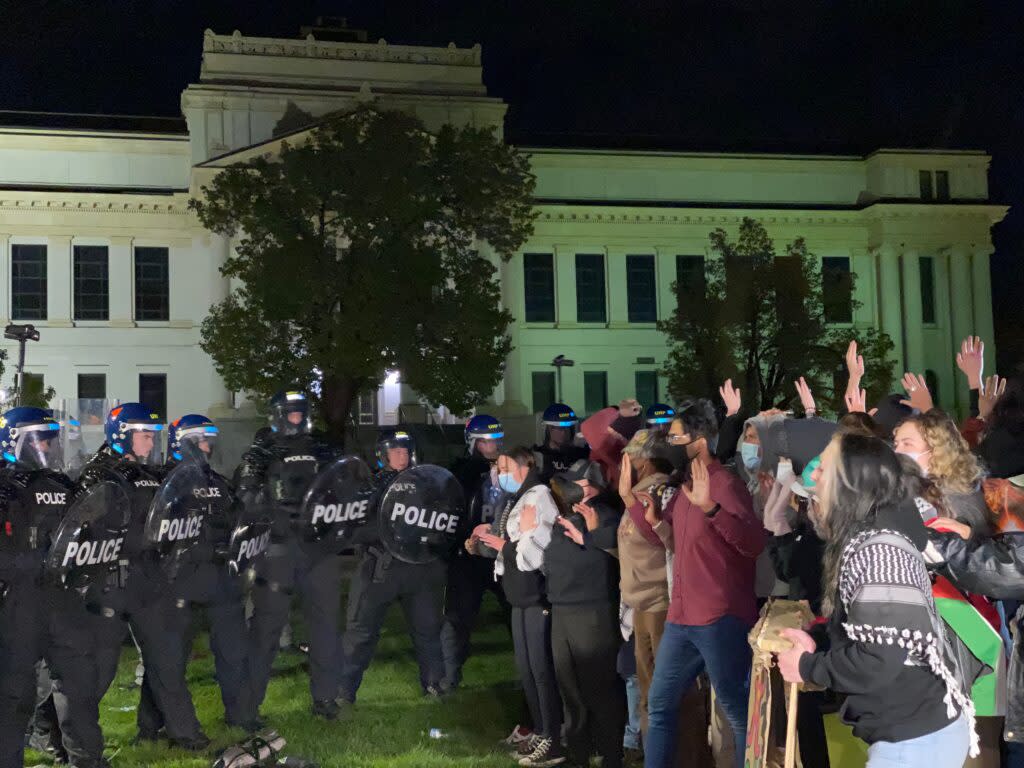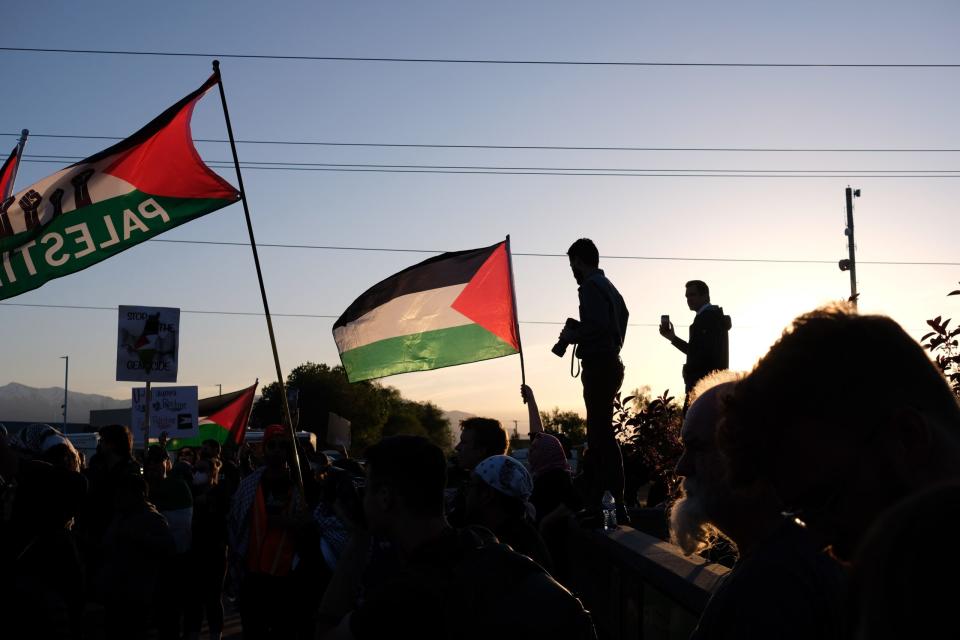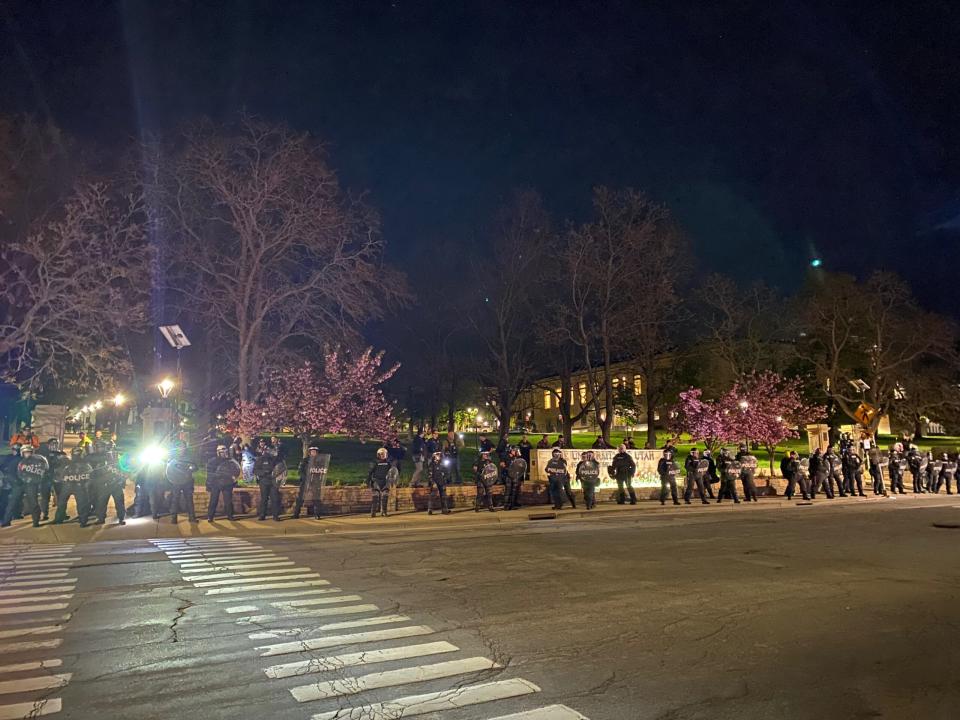University of Utah faculty ask for ‘divestment strategy’ from Israel, decry protest crackdown

Police officers and pro-Palestinian protesters clash at the University of Utah on Monday, April 29, 2024. (Kyle Dunphey/Utah News Dispatch)
Over 160 University of Utah faculty, including professors from a number of departments, have signed a joint statement asking the school to end its police presence at the recent pro-Palestinian protests and start the process of a divestment strategy “from those profiting from the war in Gaza.”
On Monday, a group of several hundred protesters gathered outside the President’s circle, calling for the university to disclose and divest from Israel and any companies that support its ongoing war in Gaza. An estimated 34,262 Palestinians and 1,139 Israelis have been killed since the war started on Oct. 7, according to the United Nations.
The protesters had planned to camp on the lawn — but citing its policy against camping, University of Utah Police along with Salt Lake Police officers, Utah Highway Patrol troopers and other local departments forcibly removed protesters, turning a peaceful event into a chaotic scene.
Since then, two other protests have taken place at the university. None have seen the violence that played out over the encampment, but officers have been present at each demonstration and made additional arrests stemming from Monday. At least 21 people have been arrested in relation to Monday’s protest.

Pro-Palestinian protesters gather outside of the Salt Lake County Jail in South Salt Lake after a student organizer was arrested on Tuesday, April 30, 2024. (Kyle Dunphey/Utah News Dispatch)
In response, 165 university faculty — 105 publicly and 56 anonymously — signed the letter addressed to University of Utah President Taylor Randall asking that the school “respond substantively” to the protester’s demands.
That includes ending the police presence at peaceful protests; forming a university committee to “examine the University’s investment portfolio and recommend a divestment strategy from those profiting from the war in Gaza”; and granting amnesty to the student organizers of recent protests.
“We vehemently object to this unprovoked and unwarranted use of force against students and community members exercising their right to free speech … we are deeply concerned about the lack of regard for the safety of our students and community,” faculty members wrote.
A number of university professors confirmed the legitimacy of the letter on Friday. The signees include professors, associate professors and assistant professors from a range of departments and schools, including English, communications, law, chemistry, social work, biological sciences, dance, history and medicine.
“These students’ actions reflect all four of the University’s learning outcomes for general education: collaborate effectively, reason effectively and act ethically, respond creatively, and persist in addressing complex problems. Peaceful protests met with police retaliation, or the threat thereof, creates a chilling effect that stifles free expression, which undercuts the University’s mission,” the letter reads.
In addition, the letter voices opposition to possible disciplinary action against students and faculty involved with the protests, which the faculty members say is “designed to deter free expression.”
In a statement earlier this week, the university said students could be suspended or placed on probation and faculty could face termination. Both could be charged with criminal trespass or disorderly conduct, the university said.
“We urge the University administration to both accept and embrace our campus as a democratic space of peaceful protest,” the letter from faculty members reads.

Police officers form a line after breaking up a pro-Palestinian encampment at the University of Utah on Monday, April 29, 2024. (Kyle Dunphey/Utah News Dispatch)
The letter also includes a now common refrain from those critical of the university’s response to Monday’s event — the school previously encouraged camping in President’s Circle just months earlier when ESPN’s College Gameday came to Utah, but said camping was the reason for the violent crackdown on the pro-Palestinian protest.
That, according to the letter, demonstrated “that encampments are permissible when the University deems them so.”
A spokesperson for the school said the ESPN Gameday event was sanctioned, while there was no permit filed for Monday’s protest and there were no associated university events.
“The University of Utah’s campus is comparable to the State Capitol or a city park — both of which close at dusk. The tents qualified as illegal structures,” said Rebecca Walsh, a spokesperson for the University of Utah.
Moving forward, the letter asks the university to collaborate with students to set aside a place for protesters to camp in protest, while requesting transparency about the “role the University administration played in the police response.”
“We call for the University to clarify how, when, and why police were directed to act on April 29, 2024,” the letter reads, adding, “We want assurance that future peaceful student protests will not be met with police violence.”
GET THE MORNING HEADLINES DELIVERED TO YOUR INBOX
The post University of Utah faculty ask for ‘divestment strategy’ from Israel, decry protest crackdown appeared first on Utah News Dispatch.

